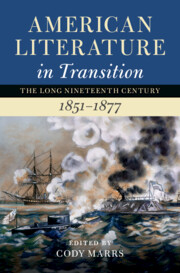Book contents
- American Literature in Transition, 1851–1877
- Nineteenth-Century American Literature in Transition
- American Literature in Transition, 1851–1877
- Copyright page
- Contents
- Figures
- Contributors
- Series Preface
- Introduction
- Part I Careers
- Chapter 1 Emily Dickinson
- Chapter 2 Frederick Douglass
- Chapter 3 Augusta Jane Evans
- Chapter 4 Herman Melville
- Chapter 5 John Rollin Ridge
- Chapter 6 Walt Whitman
- Chapter 7 Anonymous
- Part II Networks
- Part III Exchanges
- Part IV The Long Civil War
- Index
Chapter 6 - Walt Whitman
from Part I - Careers
Published online by Cambridge University Press: 15 June 2022
- American Literature in Transition, 1851–1877
- Nineteenth-Century American Literature in Transition
- American Literature in Transition, 1851–1877
- Copyright page
- Contents
- Figures
- Contributors
- Series Preface
- Introduction
- Part I Careers
- Chapter 1 Emily Dickinson
- Chapter 2 Frederick Douglass
- Chapter 3 Augusta Jane Evans
- Chapter 4 Herman Melville
- Chapter 5 John Rollin Ridge
- Chapter 6 Walt Whitman
- Chapter 7 Anonymous
- Part II Networks
- Part III Exchanges
- Part IV The Long Civil War
- Index
Summary
In one of the reviews of the 1855 Leaves of Grass, an anonymous reviewer for the Swedenborgian Christian Spiritualist conceives of Whitman’s poetry (and poetry more broadly) as aligning with a tradition of spiritual mediumship.1 The great poets, that is, possess a medial capacity to channel and develop a “spiritual intercourse” with the muse, who is herself part of the transcendent realm. Having distinguished between the “two permanent types” of media – those singular agents who are lucky enough to receive “direct influx” from the divine source of love and wisdom, and a “second class of media” that channel “individual Spirits” and “societies of Spirits” – the reviewer proceeds to outline what is happening to the idea of mediumship as society transitions into a new and disorienting phase. “Many varieties of Mediumship,” the reviewer argues, “must be expected” in this moment of social and political turmoil, and not all of them either savory or desirable. The present age now produces imitators who merely “pour forth as Divine Revelations the froth and scum of a receding age”; confidence men who give “false notions of the state of man after death”; as well as other suspect figures who merely “come in contact with the outmost portion of the Spirit-life.” Then there are those more exceptional beings, best exemplified by Ralph Waldo Emerson, who “receive influxes from the upper mind-sphere of the age” and “[see] the future of truths as our Spirit-seers discern the future of man.”2
Keywords
- Type
- Chapter
- Information
- American Literature in Transition, 1851–1877 , pp. 91 - 106Publisher: Cambridge University PressPrint publication year: 2022

